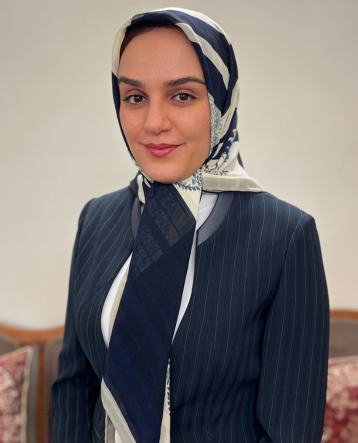Mohadeseh Taheri-Mousavi
Assistant Professor, Materials Science and Engineering
Courtesy Appointment, Mechanical Engineering
Assistant Professor, Materials Science and Engineering
Courtesy Appointment, Mechanical Engineering

S. Mohadeseh Taheri-Mousavi joined CMU as an assistant professor in September 2022 from MIT where she was a postdoctoral associate jointly in the Departments of Mechanical Engineering and Materials Science and Engineering. Before that, she was a postdoctoral fellow at Brown University. She received her Ph.D. from EPFL, Switzerland, and her B.Sc. and M.Sc. from Sharif University of Technology, Iran. She received both early and advanced prestigious Swiss National Science Foundation fellowships for her postdoctoral studies at Brown and MIT. Taheri-Mousavi’s research was funded by large funding including grants from Naval Nuclear Laboratory, NASA STRI, DARPA, NSF DMREF, and Army Research Laboratory projects.
2022 Postdoc, Massachusetts Institute of Technology
2017 Postdoc, Brown University
2015 Ph.D., EPFL, Switzerland
2008 M.Sc., Sharif University of Technology, Iran
2006 B.Sc., Sharif University of Technology, Iran
Multiple outlets
MSE’s Mohadeseh Taheri-Mousavi helped develop a new printable aluminum alloy that can withstand high temperatures and is five times stronger than traditionally manufactured aluminum.
Materials Science and Engineering
Researchers have developed a new formula for a printable aluminum alloy that is five times stronger than its conventionally manufactured counterpart by using a hybrid framework to efficiently explore the design space.
CMU Engineering
Researchers in the Materials Science and Engineering Department have pioneered the potential to train large language models to understand a novel alloy physics language in a similar manner.
Materials Science and Engineering
Three faculty members from the department of materials science and engineering at Carnegie Mellon will work on recently funded projects under the National Science Foundation’s Designing Materials to Revolutionize and Engineer our Future program.
Materials Science and Engineering
Researchers have developed a new class of aluminum alloy with an optimized composition that enhances as-built ductility, while minimizing the effects on the alloy’s strength.
Materials Science and Engineering
Using computational simulations and optimization techniques, recent research from the Taheri-Mousavi group has identified a new aluminum alloy system that can meet performance standards at a lower cost than current materials.
CMU Engineering
CMU engineers and scientists undertook more than 45 research projects to develop artificial intelligence approaches to enable the use of metal additive manufacturing for the U.S. Army.
CMU Engineering
A recent DARPA award will bring together researchers from multiple universities to develop novel turbomachinery design tools to break the one-part-one-material paradigm.
CMU Engineering
Materials science and engineering and chemical engineering faculty will collaborate on projects supported by the Naval Nuclear Laboratory to create additively manufactured structural alloys that can sustain extreme environments.
Wilton E. Scott Institute for Energy Innovation
Hydrogen (H) is the smallest atom in the universe, yet it causes billions of dollars of damage to high-strength metallic alloys through a phenomenon called H embrittlement.
Wilton E. Scott Institute for Energy Innovation
ince the Scott Institute’s founding in 2012, a core initiative has been the Seed Grants for Energy Research program. With this funding, researchers across the university receive important early-stage support for developing cutting-edge energy research.
Materials Science and Engineering
Doctoral and postdoctoral scholars from around the country convened at CMU for a program focused on developing their academic careers in MSE.
Wilton E. Scott Institute for Energy Innovation
The Wilton E. Scott Institute for Energy Innovation’s Seed Grants for Energy Research program will support three research projects in the 2023 cycle.
CMU Engineering
A new NASA Space Technology Research Institute (STRI) led by Carnegie Mellon University seeks to shorten the cycle required to design, manufacture, and test parts that can withstand the conditions of space travel through constructing models for qualification and certification.
Lifewire
MSE’s Mohadeseh Taheri-Mousavi spoke with Lifewire about using AI to discover new materials.
Materials Science and Engineering
Assistant Professor Mohadeseh Taheri-Mousavi develops models to design additively manufactured next-generation structural alloys used in extreme environments.